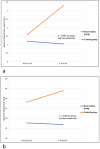Effects of a yoga-based stress reduction intervention on stress, psychological outcomes and cardiometabolic biomarkers in cancer caregivers: A randomized controlled trial
- PMID: 36355827
- PMCID: PMC9648784
- DOI: 10.1371/journal.pone.0277009
Effects of a yoga-based stress reduction intervention on stress, psychological outcomes and cardiometabolic biomarkers in cancer caregivers: A randomized controlled trial
Abstract
Caregiving stress is a risk factor for cardiometabolic disease. Therefore, integrating cardiometabolic biomarkers into caregiving research provides a more comprehensive assessment of an individual's health and response to an intervention. The objective of this study was to examine the effects of a yoga-based stress reduction intervention on stress, psychological outcomes, and cardiometabolic biomarkers in cancer caregivers. This prospective randomized controlled trial enrolled family caregivers of adult patients who underwent an allogeneic HSCT at the National Institutes of Health (NIH) Clinical Center. All subjects received usual care education. Participants in the intervention group received an Iyengar yoga intervention self-administered over six weeks using an audio recording file. The primary outcome was perceived stress (measured using the NIH toolbox Perceived Stress). The secondary outcomes were psychological factors (depression and anxiety measured using PROMIS® Depression and Anxiety), and cardiometabolic biomarkers measured by nuclear magnetic resonance spectroscopy. A total of 50 family caregivers (mean [SD] age, 44.9 [15.2] years; 42 [84.0%] women) were randomized, 25 to the intervention group and 25 to the control group. No group differences were noted in stress, depression, and anxiety. Significant interaction effects between group and time were found in large TRL-P (F(1,43) = 10.16, p = 0.003) and LP-IR (F(1,42) = 4.28, p = 0.045). Post-hoc analyses revealed that the levels of large TRL-P (mean difference = 1.68, CI = [0.86, 2.51], p< .001) and LP-IR (mean difference = 5.67, CI = [1.15, 10.18], p = 0.015) significantly increased over time in the control group but while remained stable in the intervention group (mean difference = -0.15, CI = [-0.96, 0.66], p = 0.718; mean difference = -0.81, CI = [-5.22, 3.61], p = 0.714, respectively). Even when perceptions of psychological distress remain unchanged, incorporating gentle yoga poses and breathing exercises may reduce the risk of cardiometabolic disease in caregivers by inhibiting the development of insulin resistance. Standard lipids of cardiometabolic risk do not appear to be robust enough to detect short-term early changes of cardiometabolic risk in caregivers. Trial registration: ClinicalTrials.gov Identifier: NCT02257853.
Copyright: This is an open access article, free of all copyright, and may be freely reproduced, distributed, transmitted, modified, built upon, or otherwise used by anyone for any lawful purpose. The work is made available under the Creative Commons CC0 public domain dedication.
Conflict of interest statement
The authors have declared that no competing interests exist.
Figures


Similar articles
-
Caregiving stress and burden associated with cardiometabolic risk in family caregivers of individuals with cancer.Stress. 2022 Jan;25(1):258-266. doi: 10.1080/10253890.2022.2037548. Stress. 2022. PMID: 35727023 Free PMC article.
-
Effects of a Telehealth Early Palliative Care Intervention for Family Caregivers of Persons With Advanced Heart Failure: The ENABLE CHF-PC Randomized Clinical Trial.JAMA Netw Open. 2020 Apr 1;3(4):e202583. doi: 10.1001/jamanetworkopen.2020.2583. JAMA Netw Open. 2020. PMID: 32282044 Free PMC article. Clinical Trial.
-
Study protocol for a multicentre randomised controlled trial evaluating the efficacy of an online yoga intervention in high-grade glioma patients and their caregivers: the YINOTA-O-trial.BMJ Open. 2024 Oct 16;14(10):e075698. doi: 10.1136/bmjopen-2023-075698. BMJ Open. 2024. PMID: 39414288 Free PMC article.
-
Using a Program to Lower Stress for Caregivers of Patients with Cancer Who Have Received Stem Cell Transplants [Internet].Washington (DC): Patient-Centered Outcomes Research Institute (PCORI); 2020 Jan. Washington (DC): Patient-Centered Outcomes Research Institute (PCORI); 2020 Jan. PMID: 39527677 Free Books & Documents. Review.
-
Mental health outcomes in dementia caregivers: a systematic review of yoga-based interventions.Dement Neuropsychol. 2025 Jan 27;19:e20240151. doi: 10.1590/1980-5764-DN-2024-0151. eCollection 2025. Dement Neuropsychol. 2025. PMID: 39882255 Free PMC article. Review.
Cited by
-
Nature-based virtual reality intervention to manage stress in family caregivers of allogeneic hematopoietic stem cell transplant recipients: a two-phase pilot study protocol.Front Psychiatry. 2024 Mar 7;15:1295097. doi: 10.3389/fpsyt.2024.1295097. eCollection 2024. Front Psychiatry. 2024. PMID: 38516258 Free PMC article.
-
Associations among NMR-measured inflammatory and metabolic biomarkers and accelerated aging in cardiac catheterization patients.Aging (Albany NY). 2024 Apr 23;16(8):6652-6672. doi: 10.18632/aging.205758. Epub 2024 Apr 23. Aging (Albany NY). 2024. PMID: 38656877 Free PMC article.
-
Bibliometric Analysis of Randomized Controlled Trials on Yoga Interventions for Cancer Patients: A Decade in Review.Cureus. 2024 Apr 25;16(4):e58993. doi: 10.7759/cureus.58993. eCollection 2024 Apr. Cureus. 2024. PMID: 38800314 Free PMC article. Review.
-
Symptom Clusters in Family Caregivers of Hematopoietic Stem Cell Transplantation Recipients: Loneliness as a Risk Factor.Transplant Cell Ther. 2023 Jan;29(1):50.e1-50.e8. doi: 10.1016/j.jtct.2022.09.025. Epub 2022 Oct 3. Transplant Cell Ther. 2023. PMID: 36202335 Free PMC article. Clinical Trial.
-
Factors associated with inflammatory cytokines in family caregivers of allogeneic hematopoietic stem cell transplantation (HSCT) recipients.Brain Behav Immun. 2025 Aug;128:362-369. doi: 10.1016/j.bbi.2025.04.013. Epub 2025 Apr 10. Brain Behav Immun. 2025. PMID: 40216094 Clinical Trial.
References
-
- National Alliance for Caregiving. Caregiving in the U.S. 2020. https://www.aarp.org/content/dam/aarp/ppi/2020/05/full-report-caregiving....
-
- National Alliance for Caregiving. Cancer Caregiving in the U.S.: An intense, episodic, and challenging care experience. https://www.caregiving.org/wp-content/uploads/2020/05/CancerCaregivingRe...
-
- Xie L, Shen C, Shi Y, Li H. Caregiver burden among primary family caregivers of patients undergoing HSCT: a cross-sectional study from Suzhou, China. Cancer Nurs. 2021;44(6): E556–E566. - PubMed
Publication types
MeSH terms
Substances
Associated data
LinkOut - more resources
Full Text Sources
Medical

